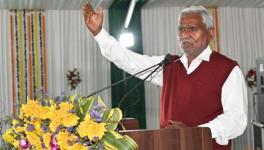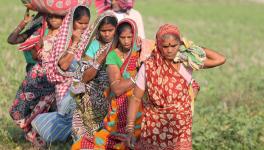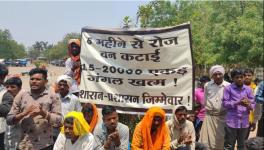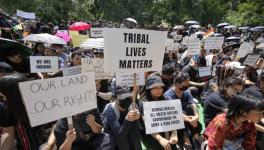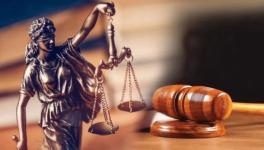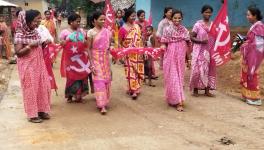‘Grave Injustice’: People’s Tribunal on SC Judgements in Zakia Jafri, Himanshu Kumar’s Petitions
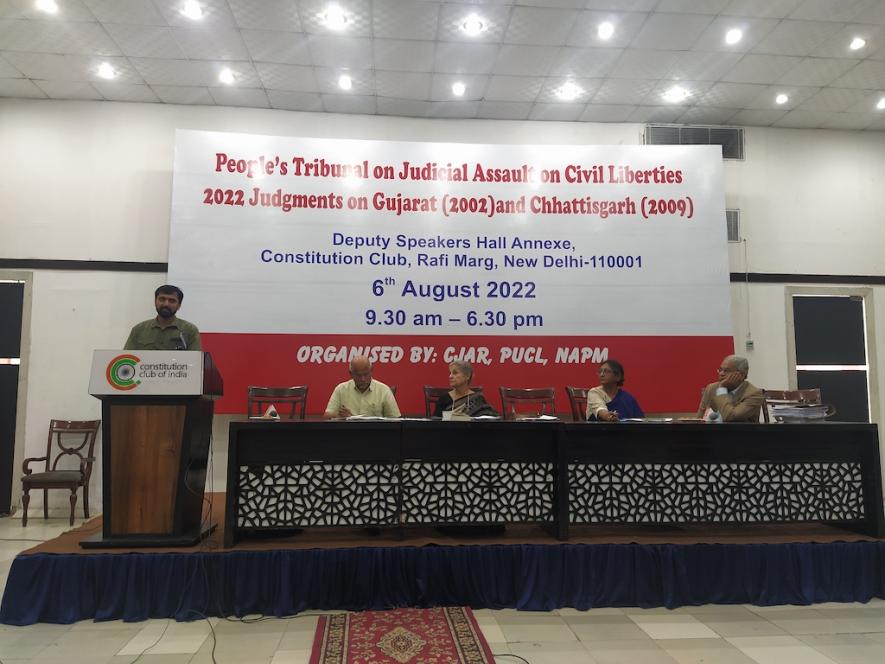
New Delhi: Noted individuals and organisations working for civil liberties and human rights held a people’s tribunal in Delhi on Saturday to address the concerns over the implications of two recent Supreme Court judgements in petitions filed by Zakia Jafri and Himanshu Kumar.
The members of the tribunal on “Judicial Rollback of Civil Liberties” consisted of Justice AP Shah (former Chief Justice of Delhi High Court), Justice Anjana Prakash (Former judge of Patna High Court), Justice Marlepalle (former judge of Bombay High Court), Professor Virginius Xaxa (Chair of the 2014 High Level Committee to examine the status of scheduled tribes), Dr Syeda Hameed (former member of Planning Commission).
In the case of activist Himanshu Kumar, the Supreme Court on July 14 dismissed a petition filed in 2009 seeking an independent probe into the alleged extra-judicial killings of adivasis by security forces in Chhattisgarh. Additionally, the top court also imposed a fine worth Rs 5 lakh on the main petitioner, Himanshu Kumar. However, the tribal rights activist has refused to pay the fine.
Counsels on behalf of the Union government claimed that the petitioners depicted killings carried out by Naxals as being done by the security forces. The division bench of Justices A.M. Khanwilkar and J.B. Pardiwala left it to the government of Chhattisgarh to take any action against the petitioners for allegedly making “false charges” under Section 211 of the Indian Penal Code (IPC), and even for “criminal conspiracy”.
Speaking to NewsClick, Kumar said: “The order said that Himanshu Kumar’s petition is false, fine should be imposed on it and it was filed to help Naxalites. Supreme Court has also permitted NIA and CBI to file FIRs against us and probe us. However, the current DIG of NIA, Amresh Kumar, was the responsible Superintendent of Police during the massacres in Chhattisgarh. There’s not only a conflict of interest, but he is an accused. The court is telling us that we should rely on their investigation.” he added, “The Supreme Court also accepted an affidavit of the Centre that claimed all those who go to the courts against the security forces are trying to help Naxalite. This means all the human rights activists are criminals and can be jailed.”
He further said: “Based on what the adivasi petitioners said under pressure while in police custody, that they did not know the perpetrators, the Supreme Court says our petition is false. But instead, they should get it investigated that who actually killed those people.”
The petition, which was moved by Himanshu Kumar and 12 others, alleged that security forces had shot about 15 tribals from Chhattisgarh’s Dantewada district in the guise of anti-Naxal operations in 2009. Their plea sought an independent investigation into the killings and asked the court to direct the government to provide compensation of Rs 5 lakh to the kin of the deceased.
Collin Gonsalves, counsel for the petitioners, pointed out that while not in police custody, every adivasi petitioner has named the security forces as the perpetrators of the 2009 killings in Gompad and Gachhanpalli villages and even identified police officials involved in it. But the Supreme Court said it found no evidence against the police, Gonsalves added. His statement was corroborated by the victims’ families cum petitioners who spoke at the tribunal.
“The petitioners did not even know whether an investigation took place. How will they? The investigators did not even come and take their statements. And not a single tribal has said that those were attacks by Naxalites,” Gonsalves said.
The adivasis whose kin died or were injured during these alleged operations in 2009, narrated their stories before the tribunal. One of them, Markam Muke, said her husband Markam Sula was dragged out of the house by the police and killed along with two other villagers. After she signed the petition for the probe, the police allegedly picked her up and kept her in custody for a month, she said. “They brought us to Delhi to give statements at the court (Tis Hazari) and told us not to take the police’s name. The police said if we did as they said, they would pay us but if not, they would kill us,” Markam Muke said. She added that she has not received any compensation till now.
In view of this, Justice AP Shah said, “The tribals who are even scared of going to the tehsildar, somehow reached the apex court to seek justice for their people who died. But instead of ordering an independent investigation into the incident, the tribals were told their petition is false, there should be criminal proceedings against them and the main petitioner should pay Rs 5 lakh fine. This is shocking.”
Zakia Jafri Case: ‘SC Failing in its Duty’
In the case of Zakia Jafri, a victim of 2002 Gujarat Riots whose husband and Congress leader Ehsan Jafri was killed in the Gulberg Society massacre, the Supreme Court dismissed her challenge to the closure report filed by the special investigation team (SIT); the order thus dismissed the allegations of a larger conspiracy by high state functionaries. It also slammed the petitioner and Teesta Setalvad, who was a co-petitioner but was not accepted as one by the court, by saying that some people kept “the pot boiling” of the case “for ulterior design” and “all those involved in such abuse of process, need to be in the dock and proceeded with in accordance with the law." This was followed by the arrest of human rights activist Teesta Setalvad and R.B. Sreekumar, the former additional director general police, by the Gujarat Anti-Terrorism Squad on the basis of an FIR that reportedly draws from the Supreme Court judgement.
Nizam Pasha, Advocate at the Supreme Court, said: “If you want to summarise Article 32 of the Constitution, it says the role of the Supreme Court to question the government’s actions and motivations. But if the Supreme Court starts reprimanding those who are raising questions then is it doing its duty? It’s failing in its duty. Then we are living in a Banana Republic.” He added, “We are not afraid of the government but the failure of constitutional safeguard on governments powers. What I find problematic in this judgment is the approach ‘how dare you (the petitioners)’.
Giving a clean chit to PM Narendra Modi, the Supreme Court held that the riot was not pre-planned, Pasha said, adding, “However, that was not our argument. We argued such a situation was created by the Sangh and its affiliated organisations that only a matchstick was needed for a riot. And the Godhra incident became that matchstick. The creating of that situation was the conspiracy.”
Advocate Mihir Desai said, “The judgement was not only wrong on merits but also for making observations against Teesta Setalvad, Sreekumar, and others. This is her (Teesta’s) life’s work. There was a huge amount of groundwork done, including staying in camps for days to collect information.” He further said, “The SC says the pot has been kept boiling for 16 years. But on March 1, 2002, the NHRC first took suo motu cognisance and visited Gujarat, and made a report. It said the entire law and order had broken down there. In 2004, the NHRC said eight key trials (of the riots) should be moved out of Gujarat.”
Desai said that Jafri first went to high court with her petition and when that was rejected, she went to the Supreme Court as that is the process. Commenting further on the judgement, he added that “Even in 2008, the Supreme Court while not moving the trials outside Gujarat said it did not want Gujarat police to investigate the cases… We did not start boiling the pot…the pot had been boiling since then.”
Commenting on the two judgements, Justice Anjana Prakash said, “Everyone in the court knows that just because one cannot prove the case for lack of evidence, it does not mean the case is false. This behaviour does not suit the court, it is not by standard procedure and rules. It is very unfortunate.”
At the end of the event, passing observation, tribunal member Justice Prakash said, “The question is not how injustice is being practised, the larger question is how to deal with it. What we heard today is not new. We went to the court for justice, but what has happened is a grave injustice.”
Virginius Xaxa also observed that the recent judgements of the Supreme Court have given immunity to the State and strengthened the executive.
The tribunal was organised by the Campaign for Judicial Accountability and Reform, People's Union for Civil Liberties, and National Alliance of People's Movements.
Get the latest reports & analysis with people's perspective on Protests, movements & deep analytical videos, discussions of the current affairs in your Telegram app. Subscribe to NewsClick's Telegram channel & get Real-Time updates on stories, as they get published on our website.










